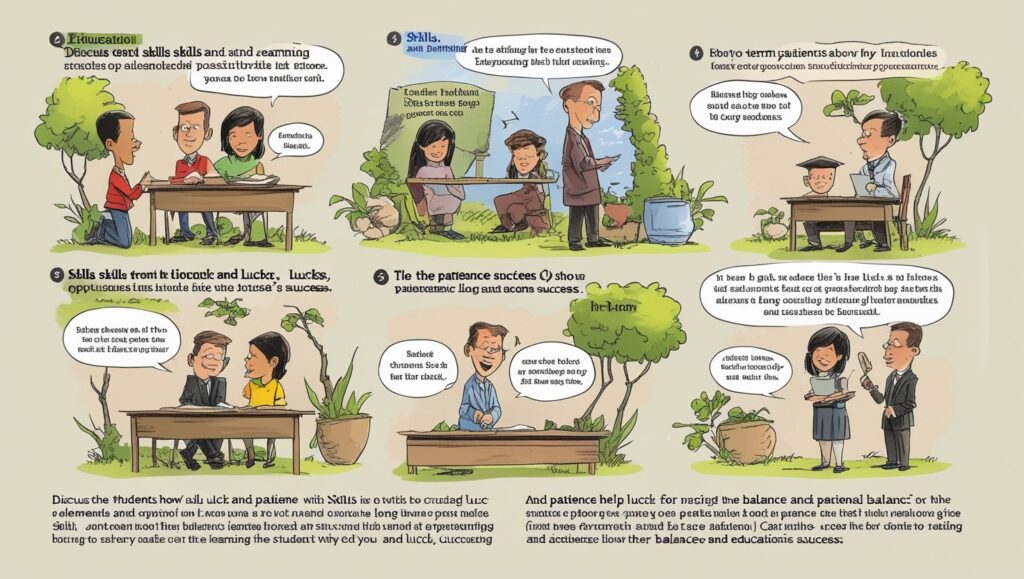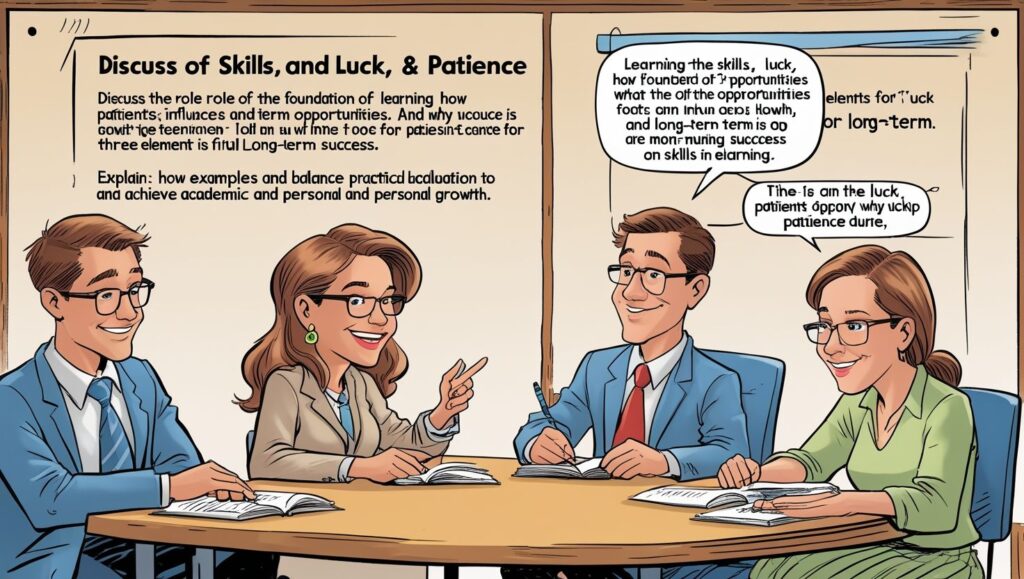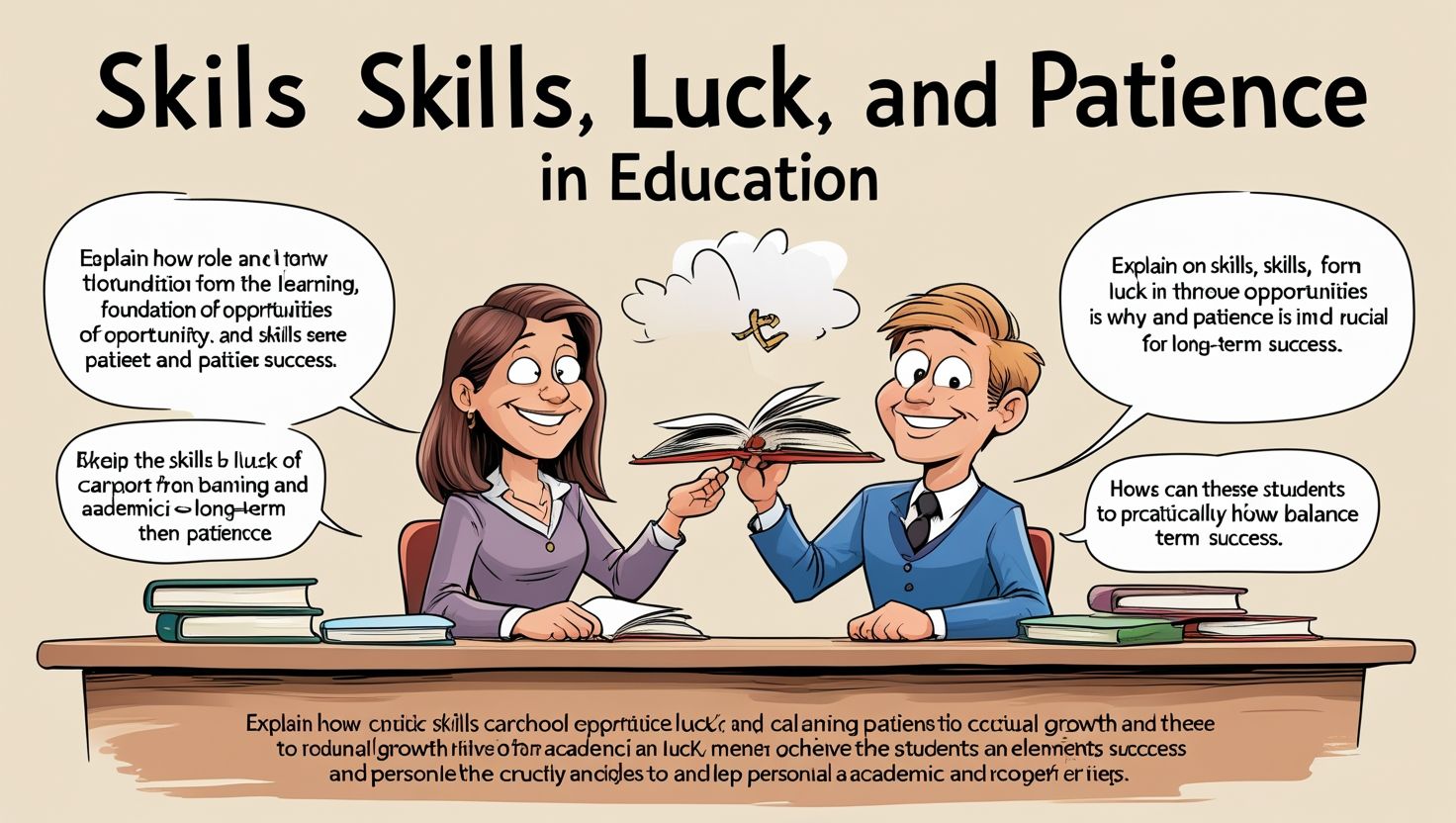Introduction
The Role of Skills, Luck and Patience in Education, Education is not merely a phase of life but a continuous journey that shapes an individual’s intellect, career, and character. While academic success is often attributed to intelligence and hard work, three critical elements play a decisive role: skills, luck, and patience. Skills are cultivated through deliberate practice, luck introduces unforeseen opportunities, and patience ensures sustained growth despite setbacks. Understanding how these factors interact can help students, educators, and parents optimize the learning process for long-term success.
This article explores the significance of each element, how they complement one another, and why a balanced approach is essential in education.
Skills: The Foundation of Learning
The Importance of Skill Development
Skills are the bedrock of education. Unlike innate intelligence, which varies among individuals, skills can be developed and refined through consistent effort. A student’s ability to think critically, solve problems, and retain knowledge determines academic performance. However, skills extend beyond textbook learning—they include both hard skills (technical knowledge) and soft skills (interpersonal abilities).
Hard Skills: The Measurable Competencies
Hard skills are teachable, quantifiable abilities that are essential for academic and professional success. These include:
- Mathematical and Scientific Proficiency – Necessary for STEM fields.
- Language and Writing Skills – Crucial for communication and expression.
- Technical Expertise – Computer programming, laboratory techniques, and other specialized knowledge.
Mastery of hard skills comes from repetition, structured learning, and real-world application. For instance, a student who practices math problems daily will perform better than one who crams before exams.
Soft Skills: The Hidden Drivers of Success
While hard skills are measurable, soft skills determine how effectively a student applies knowledge. These include:
- Communication – Articulating ideas clearly in writing and speech.
- Time Management – Balancing study, extracurriculars, and personal life.
- Emotional Intelligence – Handling stress, collaborating with peers, and adapting to challenges.
Soft skills enhance learning efficiency. A student who manages time well avoids last-minute stress, while one with strong emotional intelligence handles academic pressure better.
The Interplay Between Skills and Opportunity
While skills are within a student’s control, they do not guarantee success alone. A highly skilled individual may still struggle without opportunities. This is where luck comes into play.

Luck: The Unpredictable Factor in Education
Defining Luck in an Educational Context
Luck refers to random, uncontrollable events that influence a student’s academic journey. It can manifest in various ways:
- Meeting a Mentor – A teacher or professional who provides guidance.
- Unexpected Opportunities – Scholarships, internships, or admission into elite programs.
- Fortunate Circumstances – Access to quality education, supportive family, or financial stability.
While luck is unpredictable, students can increase their chances of benefiting from it.
How to Harness Luck in Education
- Preparation Meets Opportunity – The Roman philosopher Seneca famously said, “Luck is what happens when preparation meets opportunity.” A well-prepared student is more likely to capitalize on unexpected chances. For example, a student who has honed public speaking skills may win a debate competition only if given the opportunity—but without preparation, even the best opportunity is wasted.
- Networking and Exposure – Building relationships with teachers, peers, and professionals increases exposure to opportunities. Attending seminars, joining clubs, and engaging in academic discussions can lead to unexpected breakthroughs.
- Staying Open to New Experiences – Luck often comes from trying new things. A student who experiments with different subjects or extracurriculars may discover a passion or talent they never knew they had.
The Limits of Luck
Relying solely on luck is risky. Without foundational skills and perseverance, even the best opportunities may not yield success. This is where patience becomes crucial.

Patience: The Key to Long-Term Success
Why Patience Matters in Learning
Education is a marathon, not a sprint. Instant success is rare, and most achievements require sustained effort. Patience helps students:
- Overcome Failure – Every learner faces setbacks—failed exams, rejected applications, or difficulty grasping concepts. Patient students view these as learning experiences rather than defeats.
- Develop Mastery – True expertise takes time. A musician doesn’t become proficient overnight, nor does a scientist make groundbreaking discoveries without years of study.
- Avoid Burnout – Impatient students may cram or overwork, leading to stress and diminished performance. Patience encourages steady, balanced progress.
The Power of Delayed Gratification
The famous Stanford Marshmallow Experiment demonstrated that children who delayed gratification (waiting for a second marshmallow) later achieved higher academic success. Similarly, students who invest time in deep learning—rather than seeking quick results—perform better in the long run.
Building Resilience Through Patience
Resilience is the ability to recover from difficulties. Patient students:
- Learn from Mistakes – Instead of giving up after a poor grade, they analyze errors and improve.
- Stay Motivated – They understand that progress may be slow but remains worthwhile.
- Adapt to Challenges – Whether it’s a tough course or a competitive environment, patience helps students persist.
The Synergy of Skills, Luck, and Patience
How the Three Elements Work Together
- Skills + Luck – A skilled student is ready when luck strikes. For example, a diligent researcher may get published because a professor unexpectedly offers collaboration.
- Luck + Patience – Opportunities may take time to appear. A patient student keeps applying for scholarships until one is awarded.
- Skills + Patience – Mastery develops gradually. A writer improves over years of practice, leading to eventual recognition.
Real-World Examples
- Thomas Edison – His success wasn’t just due to skill; he also had the patience to fail 1,000 times before inventing the light bulb. Luck played a role when investors believed in his vision.
- J.K. Rowling – She had writing skills, endured rejections (patience), and got lucky when a publisher finally accepted Harry Potter.
Practical Tips for Students
- Focus on Skill Development – Practice consistently, seek feedback, and refine abilities.
- Stay Open to Luck – Network, explore new fields, and seize unexpected chances.
- Cultivate Patience – Set long-term goals, embrace failures as lessons, and trust the process.
Conclusion
Success in education is not determined by a single factor but by the interplay of skills, luck, and patience. Skills provide the foundation, luck introduces opportunities, and patience ensures perseverance through challenges.
Students who develop expertise, remain open to serendipitous moments, and maintain a long-term perspective are most likely to thrive. Rather than relying solely on talent or waiting for luck, a balanced approach maximizes potential.
Ultimately, education is a journey—one that rewards those who persist, adapt, and never stop learning. By embracing skills, acknowledging luck’s role, and practicing patience, every student can achieve academic and personal fulfillment.

6 thoughts on “The Role of Skills, Luck and Patience in Education”